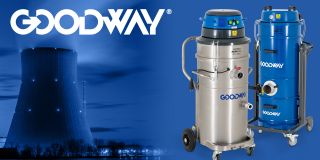Start-Ups Defy Convention, Push Nuclear Power into the Future
by Beth Kelly
Nuclear power has fallen by the wayside in the United States over the past few decades even as other forms of clean energy, such as solar, have begun to soar in both popularity and profitability. Nuclear technology has remained largely the same since the '50s, and the public's perception remains rooted in archaic stereotypes from past decades as well. Waves of change may be coming, however, as dozens of start-up firms imbue the industry with a fresh enthusiasm for doing things differently. As climate change pushed the doomsday clock closer, a revitalization of the nuclear power sector couldn't come at a better time.
Many of these young companies draw on ideas made impossible by politics in prior decades. Today, the largest challenge they face in getting started is attracting the needed capital to begin and continue operations. There was no venture funding at all for nuclear startup companies in 2012 and 2013, but investors began to put money into the sector again in 2014. Nevertheless, as actual production begins, more funding will be needed because nuclear plants are not cheap. In the golden era of nuclear power, a lot of money was provided by the federal government, but this may not be feasible today because the authorities are operating under decades-old regulations and lack the sophistication to properly evaluate new nuclear technologies.
TerraPower may have fewer immediate capital concerns because it has already secured funding from ultra-wealthy Bill Gates. TerraPower aims to develop a new traveling wave reactor. Using coolant stored at atmospheric pressures and natural air circulation to remove heat, its design is touted as being superior to current reactors in terms of safety. By using depleted uranium, generated as a waste product by other reactors, as a fuel the company hopes to provide cost-effective electricity while getting rid of the waste created by present-day nuclear power plants.
Transatomic Power also has the potential to shake up the nuclear power sector. It raised $2 million in August 2014 from Founders Fund and has secured an additional $2.5 million this year. Transatomic plans to develop a molten salt reactor, a type of reactor that was actually in operation at Oak Ridge National Lab during the '70s before it was shut down for reasons other than operational performance. Transatomic also intends to fuel its reactors with the waste products of typical light water reactors.
Many other startups are trying to carve out niches for themselves. NuScale Power and UPower are working on miniaturizing existing reactor designs to reduce costs. LPP Fusion and Tri-Alpha Energy are a couple of startups that are toying with the possibility of generating power through nuclear fusion: a vision that has bewitched many a scientist and engineer over the years but that has proved hitherto impractical.
All of these enterprises endeavor to use state-of-the-art materials and supplies, such as those offered by Rockbestos Suprenant Cable Corporation and AFL, which have partnered to produce fiber-optic cables and related equipment that can withstand the harsh environments found within nuclear reactors. ATC Nuclear makes, replaces, and refurbishes circuit boards for use in nuclear facilities, and it also offers testing devices to make sure that installed components are working as intended. These and other vendors must use strict quality controls to ensure that there are no malfunctioning parts delivered to nuclear plants that need to operate reliably 100 percent of the time.
As long as they can successfully navigate the tricky regulatory framework, new nuclear startup ventures stand a chance of reviving an industry in the United States that has effectively been put on "hold." New safety features, reactor types, fuel choices, and other technological permutations may give the industry the radical makeover it needs. Whatever advances wind up coming out of the imaginative experiments now being conducted, they'll likely make the traditional light water reactors in use today appear as dated as bell-bottom jeans or classic Ford Thunderbirds.
Beth Kelly is a freelance science writer with a strong interest in nuclear power and its potential as a clean energy source. A graduate of DePaul University, she is currently based out of Chicago, Ill. Find her on Twitter at @bkelly_88.

